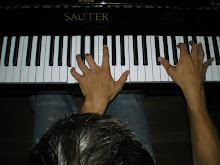I was going to write some sprawling post about how the avant-garde poses problems and how the rest of the world tries to figure them out or accept them, but then PDQ Bach came on. And it occurs to me, isn’t the last refuge for the avant-garde- humor? Seems no one in the classical establishment can take humor seriously, yet all self-respecting music historians and critics take john cage's four minutes of silence seriously.
Works like PDQ's Shleptet (a work of far more substance than Cage's) are enjoyed and even celebrated, yet i have not heard of another person who sees the great art in it. Why cant we agree that Peter Schikele's works are of importance? I thought post-modernists were supposed to undermine the concept of high art, but here we are, still treating humor like second-class (so to speak). So just what is so unart-ful about humor?
We accept the dadaists in visual arts and literature. What irony! they set out to destroy the establishment and make fun of it, but since the art world takes them seriously as great precursors of modernist avant-garde conceptualism, their works (or anti-works) are now placed in major art museums . It reminds me of that quote of Camus- "All modern revolutions have ended in a reinforcement of the power of the State." And so it is with art.
And back to the Schikele business. PDQ Bach's oeuvre are some of the greatest post-modernist works- some of the greatest compositions and constructions in the last 50 years. I dare say it. And why not? There is no logical reason that we should not take humor seriously.
Lahti
2 years ago

1 comment:
I've just come across your blog while perusing aimlessly through blogspace and have read a few entries -- this one I felt particularly inclined to comment on. I think all sorts of humor exists in 'classical music' and 'postmodernism' or whatever label you'd like to apply to it - but there are different layers of subtlety to it. Peter Schickele is sort of like the in-your-face, hit-you-over-the-head, outrageous Tom Green (does anyone like me yet?) humor... and thank God for that, eh! It has its place. And while there are certainly composers who are lacking humor in their music (depends on the personality of the guy/girl writing), I'd say you can find a great deal of it in most. Ligeti's music is full of little jokes and gibes and sardonic plays that'll make you chuckle when you hear them come out. Adès is good with humor, though he's less subtle then Ligeti -- "Brahms" for baritone and orchestra is hilariously funny. He also explores the risque side of humor in 'classical music' in "Powder Her Face" which sadly received more notoreity for its musical portrayal of fellatio then its wonderful musical content. Talk about post-modern in his devices! -- yet neither of these composers pander to the simplicities of an ADD society, like you made mention of in an earlier entry. They're both substantial, [relatively] deep composers with a lot to say -- both serious and comical. And there's nothing wrong with combining both either. Believe it or not, there's actually a great deal of musical humor in Milton Babbit's string quartets - perhaps an alter ego? I guess what I'm trying to say is that we shouldn't dismiss our fellow composers as being too serious just because they don't hit us over the head with their humor... there's a fine line between being clear in your intentions and banal.
Post a Comment